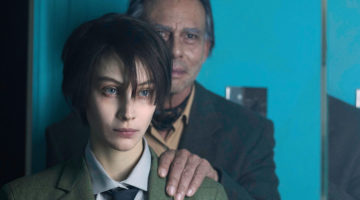WSFF 2012 Review: Who's Your Dada?
It was as surreal as it gets on the second day of the Worldwide Short Film Festival, with eight official selection shorts offering audiences insight into the bizarre, random, and self-reflexive. The collection, playfully dubbed ‘Who’s Your Dada?’ was as varied as one can get, as when the theme is the surreal, naturally nothing is connected. Or is that, unnaturally?
A five-minute black-and-white piece (The Big Tree) of whimsy kicked off the set about a man who is forced to cut down the tallest tree in Vancouver, using of course, a musical instrument. Along the way he encounters a cheerful female protestor, singing raccoons, a practicing Beaver and mallard, as well as random musical interludes. There is no easing in when it comes to surrealist art, so this entrant seems as good as any, but it does move along without much meaning.
The most compelling came by way of French and Canadian animation, with Edmond Was a Donkey¸ a simultaneously dark and uplifting tale about self-discovering. Director Franck Dion tells the story of the petite Edmund, a diligent worker at a generic factory, ostracized from his peers but well-regarded by his superiors. Those that encounter him narrate the story of Edmond, always speaking in the past tense, alluding to his end. When one prank seemingly goes too far—two misfit college place a pair of paper donkey ears on Edmund, the man embraces it, refusing to let go.
Also in the collection is a hand-drawn animated short, Kali The Little Vampire about a young blood sucker eager to escape the darkness. Sketched in black and white with the appropriate red at times, Christopher Plummer is the voice of the lonely vampire, one who watches other kids play from afar, collecting their memories once the sun departs.
By far the most interesting was a contribution by famed American documentarian Errol Morris, who interviews scholar Tink Thompson about the JFK assassination. The focus of the six minute short: the infamous Umbrella Man. The fascinating pictures of a single man standing with an open umbrella in the daylight is ultimately not as fascinating as the story itself, one that is as esoteric as anything conceived by the imagination. Thompson, an energetic and engaging storyteller is great on camera, and while the other shorts dabble in loose metaphor and introspective, The Umbrella Man gives you information for life.
Finally, there is The Twin, a highly-touted half hour short about Gustav, a man in his adult life who at long last, discovers he has a twin, Oskar. Confronted with a more relaxed, free-spirited version of himself, Gustav starts to question the banality of his own life. The surrealist twist comes by way of Oskar’s entrance to the world: it seems he has been growing inside Gustav his entire life. The absurd and somber film can only be described as deeply personal, with director Gustav Danielsson cast as Oskar, and his real-life brother Oskar, playing Gustav.
‘Art for art’s sake’ is true of several of the films in this collection, some that serve to inform, such as Woodcarver, a short that highlights a man’s murder by police, while others like Nothing Else serve to illustrate the complacency of life, but the best of the shorts are really not about the surreal, but the real. They dig digger and find the true meaning behind appearances. Be it a twin that lurks inside, or a motive behind an umbrella, directors Dion, Morris, and Danielsson succeed, commanding of their audience to look hard beneath the surface.




